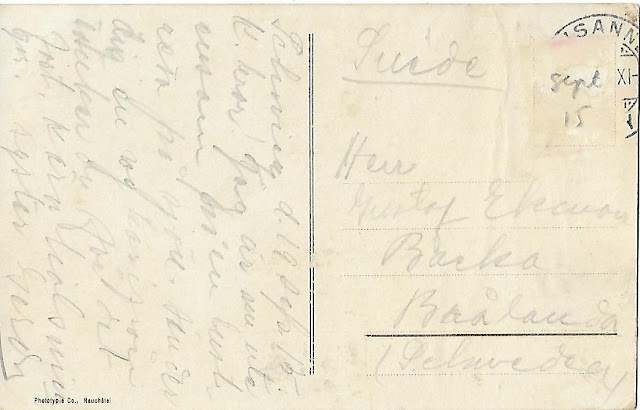G.077-01 - Evian-les-Bains, Lake Geneva (France)
 |
| 8779 - Evian-les-Bains |
Évian-les-Bains is an old spa town situated on the shore of Lake Geneva in southeastern France.
Lausanne, where the card was posted, is situated in Switzerland, on the other side of the lake.
From: Gerda (Lausanne, Switzerland, 17 Aug 1915)
 |
| 657. Lausanne. Royal-Hotel et funiculaire Lausanne-Ouchy. |
A funicular is a type of cable railway system. The line Lausanne-Ouchy was opened in 1877 as the first funicular in Switzerland.
"The term funicular derives from the Latin word funiculus, the diminutive of funis, meaning 'rope'." - "The system is characterized by two counterbalanced carriages (also called cars or trains) permanently attached to opposite ends of a haulage cable, which is looped over a pulley at the upper end of the track." [Wikipedia]
Bergbana (engelska funicular, franska funiculaire) är en typ av spårtrafik med större stigningsvinkel än vad som är normalt för järnväg och spårväg. - En vagn är fast förankrad i var ända av en eller flera stållinor, och vagnarna balanserar ut varandra viktmässigt. På banans toppstation finns maskineriet med ett stort linhjul som vanligtvis drivs av en elmotor men i äldre tider förekom ångmaskiner. Runt detta linhjul löper då stållinan, en vagn hänger i var ända av linan, och när den ena vagnen är på väg ned är den andra på väg upp; de pendlar och möts endast på mötesspåret på mitten av banan. [Wikipedia/svenska]
From: Gerda (Lausanne, Switzerland, 19 September 1915)
K. bror! Jag är nu ute ensam på en lustresa på sjön. Sänder dig en vy härifrån. Tänker du får det fort. Kära hälsningar, syster Gerda.
Dear brother, I'm now out alone on a pleasure trip on the lake. Sending you a view from here. I hope you will recieve it soon. Love, sister Gerda.
 |
| 2344. Evian-les-Baines - Terrasse de la Source Cachat |
To: Herr Carl Emanuelsson* (Gerda's and Gustaf's older brother)
Storegården, Fristad, Suède (Schweden)
From: Gerda (Evian-les-Baines, France, 21 September 1915)
"Here they take the waters at the spa"
Dear Brother, I'm sending you a view while I'm still here. Will go back to Lyon again on Friday. I hope you are all well. I'm very well. I like it here so much. I would not mind staying here for a few more weeks. Best wishes from Gerda.
G.078.01 - Christmas Greetings from Lyon
 |
| 48. LYON - La Cathedrale St-Jean et vue panoramique sur la Saóne - T.T. |
Lyon Cathedral is a Roman Catholic cathedral dedicated to Saint John the Baptist, and the seat of the Archbishop of Lyon. It was begun in 1180 on the ruins of an even older church, and completed in 1476. In our own time it has been added to the UNESCO World Heritage list. (1998) [Wikipedia]
To: Herr Gustaf Ekman, Backa, Brålanda, Suède (Sverige)
From: Gerda (sent from Lyon, France, 12.12 1915)
Lyon d. 12.12.15
Käre bror! Sände dig ett litet paket om du fått det. Jag önskar dig en God jul och ett gott nytt år! Kära hälsningar, Gerda
Lyon 12.12 1915
Dear brother, I sent you a small package, if you have received it. I wish you a Merry Christmas and a Happy New Year! Love, Gerda











I wonder what Gerda's thinking. Lovely old coloring in these postcards.
ReplyDeleteNot much room on a postcard to pour out one's heart, is there. And in wartime, also having to expect censorship, probably not wise to do so anyway. On the whole, though - aside from worrying from time to time about not having had any news from her family back in Sweden - as lady's maid to an obviously wealthy employer (I wish I knew who!) Gerda seems to have led a pretty good life in France, even during the war years.
ReplyDeleteI really have enjoyed Gerda's communications through these post cards. And even one with a photo of her! Congratulations!
ReplyDeleteThanks Barbara, it's nice to have some more people reading them with me :)
DeleteGerda's simple messages are oddly comforting even though they were written as the war began its second year. Presumably she knew about the terrible casualties and destruction. I wonder how many French soldiers she encountered in Lyon. It's possible that she might have seen captured German soldiers, as they were often transported to POW camps far from the front lines. Traveling to Switzerland during its neutrality must have been a very fantastic contrast with France's rationing and other wartime hardships.
ReplyDeleteMike, besides the war-themed postcards that she sent to her brother in 1914, I also have some unwritten cards of an English military camp (Camp Anglais). But I don't know the location of that camp, or if she ever saw it in person. There is also that one photo of her as Red Cross volunteer, though (Sepia Sat 596, Nov 2021), which indicates that she probably did come into contact with soldiers on at least some occasion.
DeleteGerda looks so peaceful and content in the photo. Over the sharing of her postcards to her brother, it sounds like she was leading a good and comfortable life. If so, she was very lucky for the times.
ReplyDeleteLa N, knowing that both cards and letters could be read by military authorities Gerda probably tried to keep her messages neutral. It's hard to know how much she was affected by the war in her everyday life and work, and in worry about the future. Materially she does seem to have been lucky for the times, I agree.
Delete